THIS SURVEY EXPLORES CANADIANS’ AND AMERICANS’ PERSPECTIVES ON THE HEALTHCARE SYSTEM IN CANADA AND THE UNITED STATES.
Our latest North American Tracker explores Canadians’ and Americans’ perspectives on the healthcare system in their respective countries.
We asked them to rate the healthcare system in their province/state and share their opinions on nurses’ working conditions, access to healthcare, government spending and more.
Our survey revealed that Canadians tend to have more negative views of the healthcare system than their American counterparts.
Download the report for the full results.
This survey was conducted in collaboration with the Association for Canadian Studies (ACS) and published in the Canadian Press. This series of surveys is available on Leger’s website.
Would you like to be the first to receive these results? Subscribe to our newsletter now.
THE HEALTHCARE SYSTEM
- 86% of Canadians and 50% of Americans are worried about the state of the healthcare system in their province/state.
- 63% of Canadians and 28% of Americans agree it is difficult to access healthcare in their province/state.
- 54% of Canadians and 19% of Americans say nurses’ working conditions in their province/state are poor.
- 44% of Canadians think healthcare workers should be allowed to take disruptive action to fight for better working conditions, however, the same proportion (44%) say that healthcare workers striking puts Canadians’ health and well-being at risk.
- 31% of Canadians support more privatization in their province’s healthcare system.
- 55% of Americans would like to see more publicly-funded healthcare in their state.

METHODOLOGY
This web survey was conducted from January 20 to 22, 2023, with 1,554 Canadians and 1,005 Americans, 18 years of age or older, randomly recruited from LEO’s online panel.
A margin of error cannot be associated with a non-probability sample in a panel survey. For comparison, a probability sample of 1,554 respondents would have a margin of error of ±2.49%, 19 times out of 20, while a probability sample of 1,005 respondents would have a margin of error of ±3.09%, 19 times out of 20.
THIS REPORT CONTAINS THE RESULTS FOR THE FOLLOWING QUESTIONS AND MORE!
- How would you rate the healthcare system in your province/state?
- How would you rate the working conditions (i.e., salary, work hours, work environment, etc.) of nurses in your province/state?
- Do you think healthcare workers should be allowed to go on strike or take other disruptive job action to fight for better working conditions in your province/state?
- Would you like to see more privatization in your province’s healthcare system?
